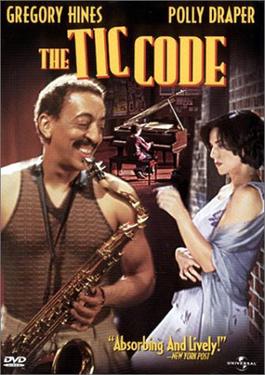The Tic Code
The Tic Code is a 1999 American drama film that explores the complexities of living with Tourette syndrome. Directed by Gary Winick and written by Polly Draper, who also stars in the film, The Tic Code delves into themes of acceptance, understanding, and the bonds formed through shared experiences. The film is notable for its sensitive portrayal of Tourette syndrome, a neurological disorder characterized by repetitive, involuntary movements and vocalizations known as tics.
Plot[edit | edit source]
The story centers around a 12-year-old boy named Miles, portrayed by Christopher George Marquette, who is a jazz piano prodigy living with Tourette syndrome. Miles struggles with the social challenges and misunderstandings associated with his condition. His life takes a turn when he meets Tyrone, a saxophonist played by Gregory Hines, who also has Tourette syndrome. Tyrone becomes a mentor and friend to Miles, helping him navigate the complexities of his condition and fostering his musical talents. The film also explores the relationship between Miles and his mother, Laura, played by Polly Draper, highlighting the challenges and triumphs of raising a child with Tourette syndrome.
Cast[edit | edit source]
- Christopher George Marquette as Miles
- Gregory Hines as Tyrone
- Polly Draper as Laura
- Carol Kane as Miss Gimpole
- Bill Nunn as Marvin
- Desmond Robertson as Todd
Reception[edit | edit source]
The Tic Code received positive reviews for its heartfelt storytelling and authentic portrayal of Tourette syndrome. Critics praised the performances, particularly those of Marquette and Hines, and the film's ability to address a sensitive topic with grace and empathy. It has been recognized for raising awareness about Tourette syndrome and for its contribution to the conversation around neurological disorders.
Themes[edit | edit source]
The film addresses several key themes, including the stigma associated with neurological disorders, the importance of acceptance and understanding, and the power of music as a form of expression and connection. The Tic Code showcases how individuals with Tourette syndrome navigate the world and highlights the strength found in community and shared experiences.
Impact[edit | edit source]
The Tic Code has had a lasting impact in terms of raising awareness about Tourette syndrome and promoting a more nuanced understanding of the condition. It has been used as an educational tool in schools and by various organizations to foster empathy and understanding towards individuals with Tourette syndrome and other neurological conditions.
See Also[edit | edit source]
Search WikiMD
Ad.Tired of being Overweight? Try W8MD's physician weight loss program.
Semaglutide (Ozempic / Wegovy and Tirzepatide (Mounjaro / Zepbound) available.
Advertise on WikiMD
|
WikiMD's Wellness Encyclopedia |
| Let Food Be Thy Medicine Medicine Thy Food - Hippocrates |
Translate this page: - East Asian
中文,
日本,
한국어,
South Asian
हिन्दी,
தமிழ்,
తెలుగు,
Urdu,
ಕನ್ನಡ,
Southeast Asian
Indonesian,
Vietnamese,
Thai,
မြန်မာဘာသာ,
বাংলা
European
español,
Deutsch,
français,
Greek,
português do Brasil,
polski,
română,
русский,
Nederlands,
norsk,
svenska,
suomi,
Italian
Middle Eastern & African
عربى,
Turkish,
Persian,
Hebrew,
Afrikaans,
isiZulu,
Kiswahili,
Other
Bulgarian,
Hungarian,
Czech,
Swedish,
മലയാളം,
मराठी,
ਪੰਜਾਬੀ,
ગુજરાતી,
Portuguese,
Ukrainian
Medical Disclaimer: WikiMD is not a substitute for professional medical advice. The information on WikiMD is provided as an information resource only, may be incorrect, outdated or misleading, and is not to be used or relied on for any diagnostic or treatment purposes. Please consult your health care provider before making any healthcare decisions or for guidance about a specific medical condition. WikiMD expressly disclaims responsibility, and shall have no liability, for any damages, loss, injury, or liability whatsoever suffered as a result of your reliance on the information contained in this site. By visiting this site you agree to the foregoing terms and conditions, which may from time to time be changed or supplemented by WikiMD. If you do not agree to the foregoing terms and conditions, you should not enter or use this site. See full disclaimer.
Credits:Most images are courtesy of Wikimedia commons, and templates, categories Wikipedia, licensed under CC BY SA or similar.
Contributors: Prab R. Tumpati, MD

